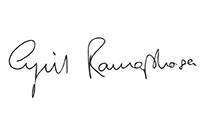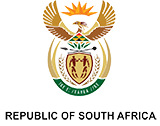Dear Fellow South African,
As a nation that fought and defeated apartheid, we have a particular obligation to stand up for justice and fundamental human rights for all people, everywhere. It is this obligation that informed our application to the International Court of Justice (ICJ) to halt the violence unleashed by Israel on the Gaza Strip.
The Genocide Convention was unanimously adopted by the United Nations General Assembly in the immediate aftermath of the Holocaust, one of the worst crimes in modern history. Having witnessed the mass extermination of six million Jews and millions of other victims of the Nazis, the world came together to prevent such atrocities from occurring again.
As a signatory to that convention, South Africa carries a responsibility, like other states that are signatory to the convention, to prevent acts of genocide wherever they occur. It was in fulfilment of this responsibility and to prevent further civilian deaths and destruction that South Africa took this case to the court.
The International Court of Justice listened to the South African case and in turn also listened to the Israeli case. In its order handed down last week, the ICJ found that it is plausible that Israel has committed acts that are in violation of the Genocide Convention to which South Africa, Israel and many other countries are signatories.
The International Court of Justice ruled that the State of Israel shall, in accordance with its obligations under the Convention on the Prevention and Punishment of the Crime of Genocide, in relation to Palestinians in Gaza, take all measures within its power to prevent the commission of all acts within the scope of Article II of this Convention, in particular: killing members of Palestinians group; causing serious bodily or mental harm to Palestinians; deliberately inflicting on Palestinians conditions of life calculated to bring about their physical destruction in whole or in part; and imposing measures intended to prevent births of Palestinian children.
The court further ruled that the State of Israel shall ensure with immediate effect that its military does not commit any acts set out above. The State of Israel shall take all measures within its power to prevent and punish the direct and public incitement to commit genocide in relation to members of the Palestinian group in the Gaza Strip. In effect, the court said that the steps Israel claims to be taking in respect of international law are insufficient.
On the issue of humanitarian assistance, the court ruled that the State of Israel shall take immediate and effective measures to enable the provision of urgently needed basic services and humanitarian assistance to address the adverse conditions of life faced by Palestinians in the Gaza Strip.
The court further directed the State of Israel to take effective measures to prevent the destruction and ensure the preservation of evidence related to allegations of acts within the scope of the Convention on the Crime of Genocide against members of the Palestinian group in the Gaza Strip. The court also ruled that Israel should submit a report within a month on all measures taken to give effect to the court’s order.
Criticism of the atrocities committed by the Israeli military is not directed at any religious or ethnic group, and cannot simply be dismissed as antisemitism. Nor can our case before the ICJ be said to diminish the enormity of the Holocaust. On the contrary, it is the experience by humanity of the Holocaust and other acts of genocide that motivates our efforts to prevent anything of this nature from happening again.
As government we have been consistent about the application of international law. We have been equally consistent in condemning the atrocities committed by Hamas against Israeli civilians on 7 October 2023 and in calling for the release of hostages still being held in Gaza. Yet, as we argued in our case before the ICJ, this attack on civilians in Israel cannot justify the subsequent acts committed by the Israeli military against the residents of Gaza.
This court application is about the Palestinian people; their suffering, the deprivation of their rights, and the denial of their right to self-determination. Yet, in bringing this application we are seeking to reinforce, protect and advance the rights of all people at all times.
The unprecedented onslaught against the people of the Gaza Strip by the Israeli military is an assault on all those who believe in justice, human rights and respect for international law.
As South Africa, we have called these genocidal acts that the international community has a duty to halt and hold Israel accountable for. As South Africans who are committed to peace, justice and human rights, we are proud to stand on the right side of history.
The eminent novelist Primo Levi, himself a Holocaust survivor, wrote: “As long as there is suffering in the world, our duty to remember is not fulfilled.”
If the slogan ‘Never Again’ is to offer hope for humankind, the lessons of not just the Nazi Holocaust, but all forms of genocide, must be practically and consistently applied.
At the time they were committed, and despite glaring evidence, there were those who claimed they were unaware of the extent of the horrors committed by the Nazis or others like the Bosnian Serb armed forces or the Interahamwe in Rwanda. In our own country there were also those who feigned ignorance about apartheid and its true impact on our people.
A genocide is unfolding in the Gaza Strip and we have a moral duty to act.
Let it be recorded in the history books that the democratic South Africa was not among those who shut their eyes or claimed they didn’t know.
I call on all South Africans to rally behind our call for justice for the Palestinian people, and for a negotiated settlement that will bring about a just peace between Israelis and Palestinians.
This cause is a reminder to us all that justice for only some is justice for none.
With best regards,

- Tags:
- Genocide convention /
- Gaza /
- Israel /
- International Court of Justice /
- Hamas
Tweet


